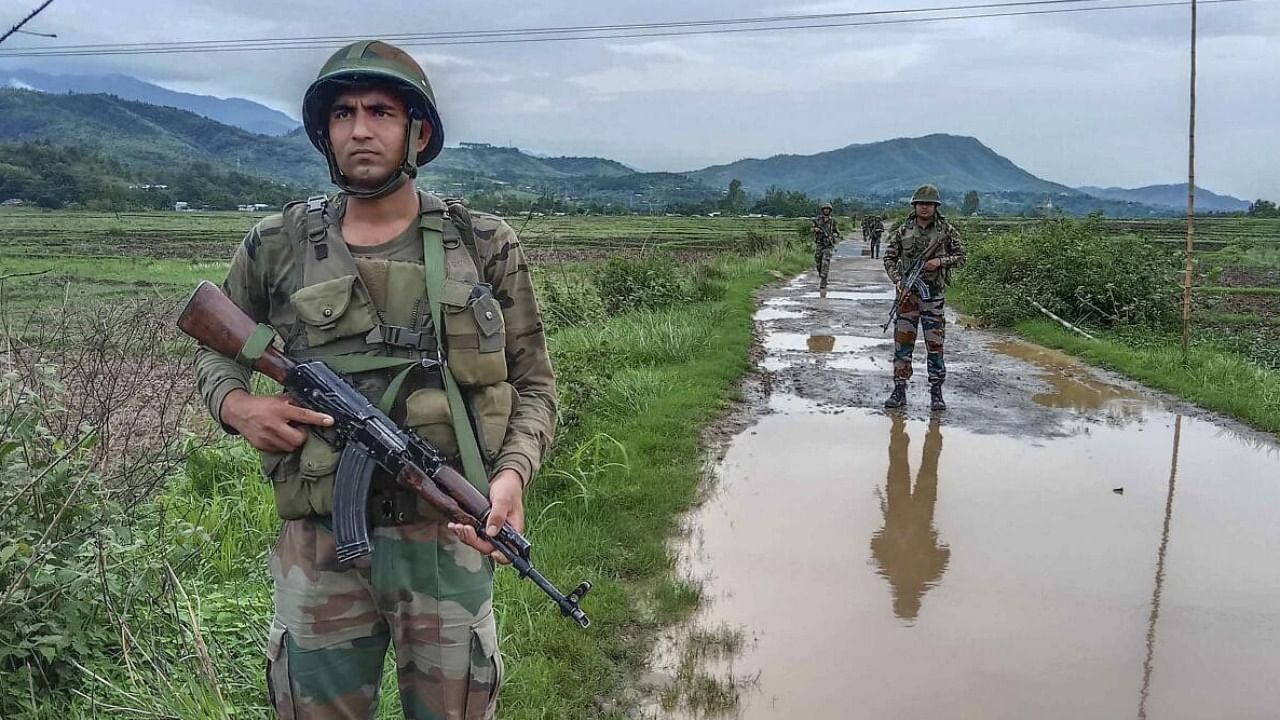
Representative image showing security personnel in Manipur.
Credit: PTI File Photo
As the Manipur crisis continues, greater numbers (around 40,000) of central forces are being deployed in the state. The deployment, however, is not without controversy.
Given the mistrust among the ethnic communities, the involvement of central forces in restoring ‘public order’ in the state is being questioned by some groups, opposed by some, and welcomed by some others.
Surprisingly, there are instances of Manipur police filing FIRs against central forces alleging “interference while performing their duty” despite the fact that the ruling party both at the Centre and in Manipur is the same. This raises larger questions on the constitutionality of the deployment of the ‘armed forces of the Union’ in Indian states.
Under what circumstances can the central forces be deployed in the federal units? Under Entry 1, List I of the Constitution, the “defence of India and every part thereof” is the Union government’s responsibility. This provision gives blanket power of deployment of ‘armed forces of the Union’ in any state for the defence of the country. The central forces can also be deployed in aid of the civil power “when there is a serious public disorder which threatens the security of the state or of the country itself...” The Centre may also deploy its armed forces when any property of the Union situated in a state requires special protection, which the state government concerned is unable to provide. Under Article 355, the Centre can deploy its forces to protect a state against “external aggression and internal disturbance” even when the state concerned does not take the Centre’s help and is unwilling to receive the central forces.
Can the deployment be made suo motu by the Centre? Or, is it done only on request of the states? What if the states oppose such deployment? As per Entry 2A in List I, “Deployment of any armed forces of the Union or any other force subject to the control of the Union or any contingent or unit thereof in any state in aid of the civil power; powers, jurisdiction, privileges and liabilities of the members of such forces while on such deployment” falls within the Centre’s jurisdiction. It is not unconstitutional if the deployment is done suo motu. In fact, there were instances in the past when the Centre deployed its forces in the states without the latter’s invitation or consent to maintain ‘public order’ or to protect the Union’s properties.
The phrase “in aid of the civil power” in Entry 2A of List I and Entry 1 in List II signifies that the deployment is in aid of the instrumentalities of the state charged with the maintenance of public order. It does not necessarily imply that such deployment should take place only at the request of the state government. In case of a state’s opposition to deployment of armed forces of the Union, constitutionally, the right course is first to issue directives under Article 355 to the state concerned, and “in the event of the state not complying with the directive of the central government, the Centre can take further action under Article 356 (by imposing President’s rule)”.
How prudent is such unilateral deployment? The Task Force on Internal Security constituted by the Committee on Centre-State Relations called such a situation “unwise”. The body, in fact, advised that the central forces have to operate with the “cooperation of the state administration, especially the state police”. Earlier, the Sarkaria Commission also observed that any unilateral action “may not be politically proper”, though such an act may be constitutionally appropriate. The right course suggested was “through concerted and coordinated action of the Union forces and the state instrumentalities concerned.” Though prior consultation with the state government is not obligatory, it is desirable that the state concerned be consulted, wherever feasible, and its cooperation sought by the Union government.
The Manipur case clearly suggests that de-politicisation of security is important at this juncture. On the pretext of day-to-day administration, the spirit and morality of the Constitution should not be compromised. Serious issues like internal security have to be looked into at the national level. However, at the same time, the views and sentiments of the states and local governments have to be taken into consideration. It goes without saying that any effective response to threats to internal security needs greater cooperation among various levels of governments: Centre, state, and local. As the Sarkaria Commission rightly observes, “the very purpose of the deployment of the armed forces of the Union to restore public order cannot be achieved without the active assistance and co-operation of the entire law-enforcing machinery of the state government.”
In this regard, inserting a new entry titled ‘Internal Security’ in the Concurrent List of the Constitution may be considered.
(The writers are, respectively, Director, and Research Affiliate, Centre for East Asian Studies, Christ University, Bengaluru)